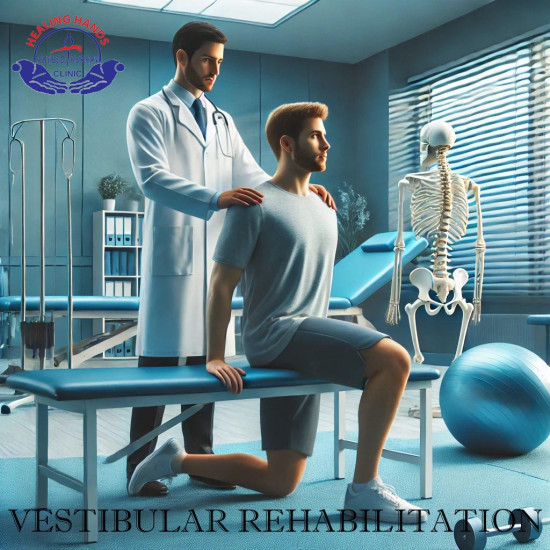Vestibular Rehabilitation

- Stock: 1000
- Model: 2416
Vestibular rehabilitation (VR) is a
special type of therapy designed to help people with vestibular disorders,
which affect balance and cause dizziness. It’s an exercise-based program that
aims to reduce symptoms like vertigo (a spinning sensation), dizziness,
unsteady vision, and balance issues that can lead to falls. For many people,
the damage to the vestibular system (part of the inner ear that controls
balance) is permanent. However, the brain can learn to use other senses like
vision and body awareness to compensate for the loss, helping you feel better
and regain your ability to function.
How
Does It Work?
When you come in for vestibular
rehabilitation, a physical therapist will start by assessing your symptoms and
looking at your medical history. The assessment might include checking:
- Balance and leg
strength/flexibility
- How you walk (gait)
- How stable your vision is and how
well your eyes move
- Neck movement and the strength of
your neck and arms
- Positions that may trigger your
symptoms, including an inner ear exam
The main goal of VR is to help your
brain compensate for the vestibular damage by using exercises tailored to your
specific problems. To create the best exercise plan, a thorough examination is
needed. Depending on what’s found, the therapy might focus on three main types
of exercises:
1. Habituation:
Exercises that reduce dizziness by exposing you to the movements or positions
that make you dizzy, helping your brain get used to them.
2. Gaze Stabilization:
Exercises that improve your ability to keep your vision steady when your head
moves.
3. Balance Training:
Exercises that help you become more stable and confident in your movements.
Conditions/Symptoms
Treated
Vestibular rehabilitation is often
recommended for people who have conditions like:
- Dizziness or blurry vision when
moving your head
- Neck pain, stiffness, or tightness
- Imbalance or needing to hold onto
something while walking
- Headaches
- Frequent falls
- General feelings of dizziness,
wooziness, or a foggy head
- Vertigo or spinning sensations
Who
Will Benefit?
Vestibular rehabilitation can be very
helpful for anyone experiencing dizziness, ear pressure, nausea, ringing in the
ears, chronic headaches, or balance problems. If you stick with the exercises,
you can expect a significant reduction in symptoms, and in some cases, the
symptoms may go away completely.
One common vestibular issue is Benign
Paroxysmal Positional Vertigo (BPPV), where physical therapy has been very
successful. For BPPV, treatment might only take a few sessions focused on
specific movements to reposition crystals in your inner ear. If your symptoms
are related to another condition, the therapy might take a few weeks of regular
exercises, but many patients see a big improvement in their symptoms and
quality of life after completing the therapy.
Unlimited Blocks, Tabs or Accordions with any HTML content can be assigned to any individual product or to certain groups of products, like entire categories, brands, products with specific options, attributes, price range, etc. You can indicate any criteria via the advanced product assignment mechanism and only those products matching your criteria will display the modules.
Also, any module can be selectively activated per device (desktop/tablet/phone), customer login status and other criteria. Imagine the possibilities.







